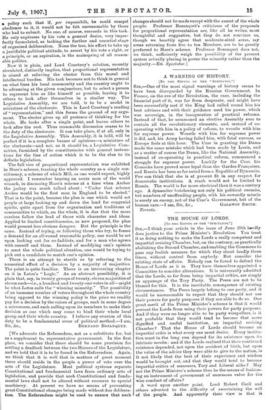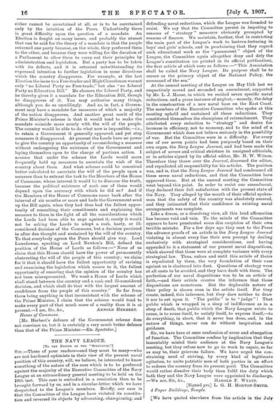THE HOUSE OF LORDS.
[TO TUE EDITOR OP TII/C "SPECTATOR.".1
SIR,—I think your article in the issue of June 29th hardly does justice to the Prime Minister's Resolution. You treat it as doing nothing to make the Lords a really competent and impartial revising Chamber, but, on the contrary, as practically abolishing the Second Chamber, and enabling the Commons to pass any foolish measure for which they shout loudly three times, without control from anybody. But consider the existing state of affairs. Nobody can be found to defend the House of Lords as it is. They have themselves appointed a Committee to consider alterations. It is universally admitted that the Lords, so far from being impartial critics, are simply an appanage of the Tory Party. The Peers are not to be blamed for this. It is the inevitable consequence of existing circumstances. The Peers largely belong to one party, and it would be unreasonable to expect that they should not use their powers for party purposes if they are able to do so. One great merit of the Prime Minister's scheme is that it would prevent the Lords from using their powers for party purposes. And if they were no longer able to be party wirepullers, is it not probable that they would tend to become that more dignified and useful institution, an impartial revising Chamber? That the House of Lords should become an impartial critic is what every one must desire. Every institu- tion must in the long run depend for its existence upon its intrinsic merits : and if the Lords realised that their continued existence depended, not upon the accident of birth, but upon the value of the advice they were able to give to the nation, is it not likely that the best of their experience and wisdom would be brought out, and that they would tend to become impartial critics of measures, Tory and Liberal alike ? May not the Prime Minister's scheme thus be the means of fashion- ing an instrument of government of enormous value for the wise conduct of affairs ?
A word upon another point. Lord Robert Cecil and others adverted to the difficulty of ascertaining the will of the people. And apparently their view is that it either cannot be ascertained at all, or is to be ascertained only by the intuition of the Peers. Undoubtedly there is great difficulty upon the question of a mandate. An Election is fought on many issues, and probably the utmost that can be said for the theory of a mandate is that the people returned one party because, on the whole, they preferred them to the other, and because they were willing for the duration of a Parliament to allow them to carry out their principles by administration and legislation. But a party has to be taken with its defects, and it is returned notwithstanding its expressed intention to further legislation in some directions which the country disapproves. For example, at the last Election the issue to a Free-trader and High Churchman was not only "no Liberal Party no Free-trade," but also "no Liberal
Party no Education Bill." He chooses the Liberal Party, and he thereby gives it a mandate for the Education Bill, though he disapproves of it. You may authorise many things, although you do so unwillingly. And so, in fact, a. Govern- ment may have a mandate for measures of which a majority of the nation disapproves. And another great merit of the Prime Minister's scheme is that it would tend to make the mandate coincide more nearly with the will of the people. The country would be able to do what now is impossible,--i.e., to retain a Government it generally approved, and yet stop measures it disapproved. At present the Lords have no power to give the country an opportunity of reconsidering a measure without endangering the existence of the Government and laying themselves open to the charge of partisan action. I assume that under the scheme the Lords would more frequently hold up measures to ascertain the wish of the country about them. And what scheme could be conceived better calculated to ascertain the will of the people upon a measure than to entrust the task to the Members of the House of Commons, whose interest it would be to discover the truth, because the political existence of each one of them would depend upon the accuracy with which he did so ? And if the Members of the House of Commons came back after the interval of six months or more and bade the Government send up the Bill again, when they had thus had the fullest oppor- tunity of consulting their constituents and explaining the measure to them in the light of all the considerations which the Lords had been able to urge against it, surely it would not be asking the Lords to adopt a rash, hasty, or ill- considered decision of the Commons, but a decision persisted in after due thought and sustained by the will of the country. To that everybody agrees the Peers should give way. Lord Lansdowne, speaking on Lord Newton's Bill, defined the position of the House of Lords as follows :—" None of us claim that this House should have the power of permanently obstructing the will of the people of this country; we claim for it that it should have the fullest opportunity of revising and examining the legislation which comes to it, the fullest opportunity of ensuring that the opinion of the country has not been misrepresented. We want a House of Lords which shall stand between the country and a rash and ill-considered decision, and which shall do that with the largest amount of confidence from the people of this country." So far from there being anything in that inconsistent with the scheme of the Prime Minister, I claim that the scheme would tend to make every part of that much more of a reality than it is at
[Mr. Herbert's defence of the Government scheme does not convince us, but it is certainly a very much better defence than that of the Prime Minister.—En. Spectator.]















































 Previous page
Previous page